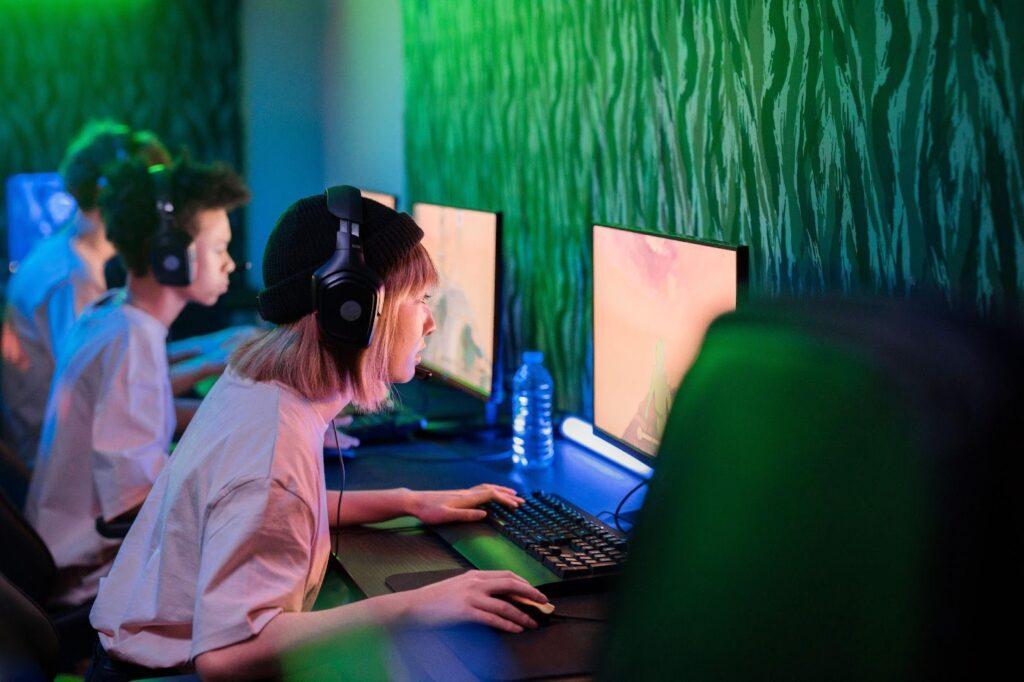
Exploring AI’s Role in Enhancing Online Gaming Platforms
With its growth, the online gaming market has grown to substantially contribute to the worldwide entertainment industry. In 2024, the Video Games market is projected to reach a revenue of US$282.30bn showing a steady increase over the years. This industry’s expansion is driven by various factors, including the rise of mobile gaming and the popularity of multiplayer online games.
With 77% of Millennials and 81% of Gen Z consumers actively engaging in video games, the industry’s influence spans diverse demographics, offering users a broad spectrum of genres and experiences.
Artificial Intelligence (AI), at its core, is a branch of computer science that aims to create systems capable of performing tasks that typically require human intelligence. These tasks include learning, decision-making, and problem-solving. AI technology has evolved significantly since its inception, becoming a transformative force in various sectors.
The journey of AI began in the mid-20th century, with milestones such as the creation of the Turing Test and the development of neural networks. Over the years, AI has permeated numerous industries, revolutionizing operations, enhancing efficiency, and opening up new possibilities for innovation and growth.

AI’s Impact on Online Gaming Platforms
Artificial Intelligence (AI) has significantly shifted how online gaming platforms engage with their users. AI technology has enabled a more nuanced approach to game personalization by analyzing player behavior and preferences.
This sophisticated analysis involves tracking player actions, choices, and interactions within the game, which is then used to create a unique gaming profile for each user. Based on these profiles, AI algorithms can recommend games that align closely with individual preferences, enhancing the likelihood of player engagement and retention.
Personalization: AI-driven recommendations and customized gaming experiences
The personalization extends to the gameplay experience itself. AI can adjust game difficulty, suggest relevant in-game purchases, or even modify storylines in real-time, tailoring the game environment to suit the player’s skill level and interests. This dynamic adaptation not only makes games more accessible to a broader range of players but also adds depth to the gaming experience, ensuring that players remain engaged and satisfied.
The result is a heightened level of player engagement, as games become a form of entertainment and a personalized experience that resonates more deeply with individual preferences and play styles.
The role of AI in enhancing interactivity within online games is another area where its impact is profoundly felt. AI-driven chatbots and NPCs (Non-Player Characters) have revolutionized how players interact within the gaming world.
These AI characters offer more realistic and responsive interactions, which significantly elevates the game’s immersion level. Unlike traditional static NPCs, AI-driven characters can engage in natural, context-aware dialogues, react to player actions in a more human-like manner, and even develop ‘personalities’ that evolve based on interactions with the player.
Security and Fraud Detection
The security of online gaming platforms is paramount. AI’s advanced pattern recognition and anomaly detection capabilities are instrumental in identifying and mitigating potential cyber threats, thereby safeguarding the platforms and their users.
AI also plays a crucial role in fraud detection within online gaming platforms. By analyzing transaction patterns and player behavior, AI systems can identify suspicious activities, helping to prevent fraud and protect users’ interests.
Integrating AI in new online casinos in the USA has enhanced various aspects of the gaming experience. From improving game fairness and security to offering personalized gaming experiences, AI’s application in these platforms exemplifies its potential and versatility in online gaming.
Game Development and Fair Play
Including AI in game development has opened the door to creating more intricate and captivating gaming environments. By employing sophisticated AI algorithms, game developers can construct elaborate game worlds that respond dynamically to player actions, elevating engagement and immersion. These algorithms can generate complex scenarios that adapt in real time, offering a customized experience that evolves based on the player’s choices and interactions within the game.
The complexity is not limited to the game’s environment alone. AI can also influence character development, plot progression, and even in-game physics, leading to a more nuanced and realistic gaming experience.
AI can create non-linear storylines that branch out based on the player’s decisions, resulting in multiple possible game endings. This ability to offer a highly personalized gaming journey makes each player’s experience unique, driving higher levels of engagement and replayability.
Maintaining a fair and competitive environment is paramount. AI algorithms are increasingly used to ensure fair play by detecting and preventing cheating. These algorithms analyze vast amounts of game data in real time, identifying patterns and behaviors indicative of cheating, such as speed hacks, aimbots, or other unfair advantages.
Future of AI in Online Gaming
The future of AI in online gaming is marked by promising trends and predictions. Emerging technologies, such as machine learning and deep learning, are expected to further refine and expand AI’s capabilities in game development, user experience enhancement, and security.
From a global perspective, AI’s continued evolution in online gaming will likely lead to more innovative and immersive gaming experiences. In the USA, where the online gaming market is particularly dynamic, AI’s influence is anticipated to be significant, driving the industry’s growth and shaping its future trajectory.

Conclusion
AI’s role in enhancing online gaming platforms is multifaceted and transformative. From personalizing user experiences to ensuring game integrity and platform security, AI’s integration into the online gaming industry signifies a new era of technological advancement and immersive digital entertainment. This technology is evolving with its impact on the online gaming landscape and is expected to be profound and far-reaching, offering exciting prospects for players and developers alike.
Recommended

Can a VPN really lower your game ping? Myths vs. reality
Do you really need it?

MrBeast takes action on Ava controversy, responds to allegations
MrBeast has launched a private probe.








